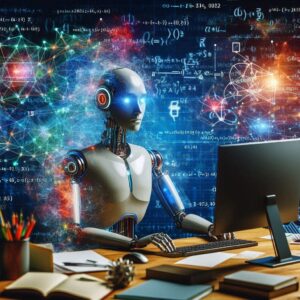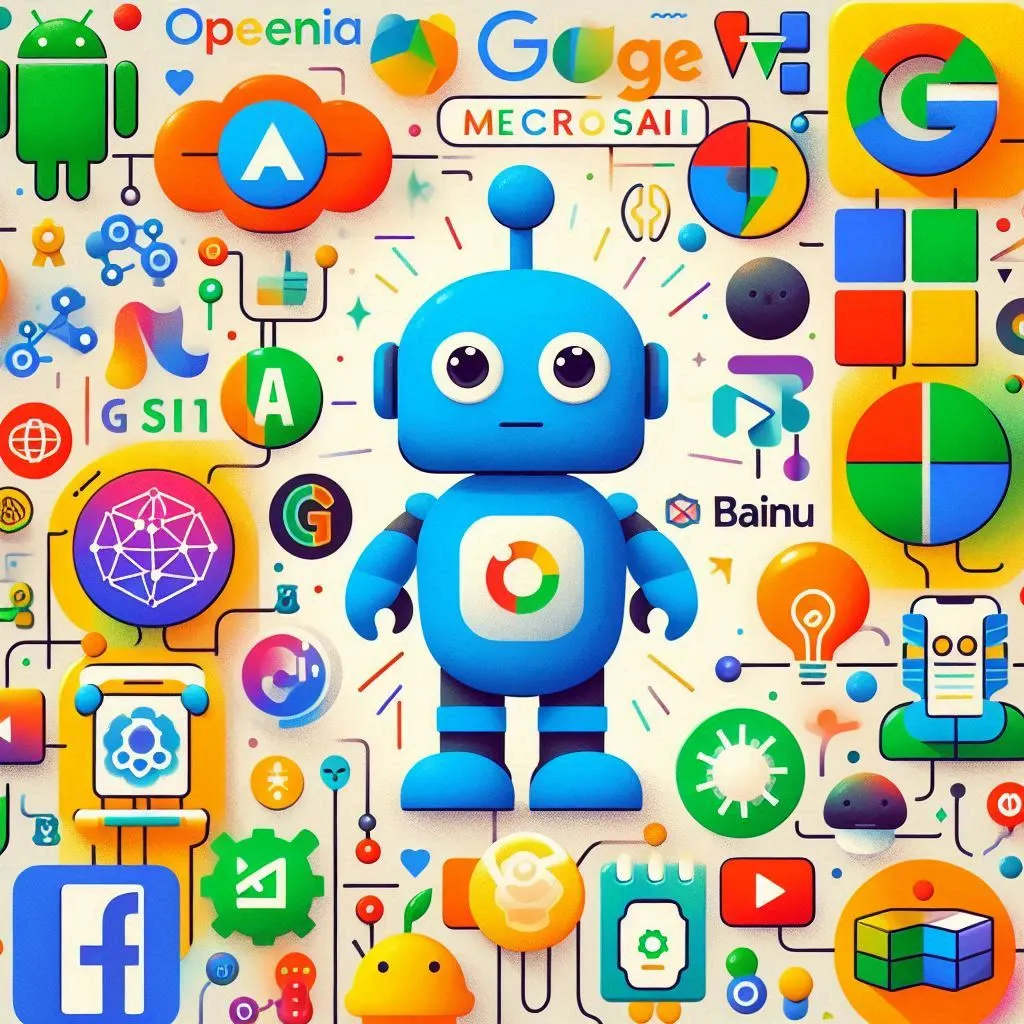The Rise of Generative AI: A New Era
Generative AI is one of the most exciting and rapidly evolving areas of artificial intelligence. It holds the potential to revolutionize a wide range of industries by enabling machines to create content that is indistinguishable from that produced by humans. In a recent Turing Lecture, experts delved into the technological advancements, applications, ethical considerations, prospects, and challenges associated with generative AI. This article aims to explore these aspects in detail, providing a comprehensive overview of the current state and future potential of generative AI.
Technological Advancements in Generative AI
Generative AI has made significant strides in recent years, thanks to advancements in machine learning and deep learning technologies. One of the most notable advancements is the development of large-scale language models, such as OpenAI’s GPT-3, which can generate human-like text based on a given prompt. These models are trained on vast datasets and can produce coherent and contextually relevant content, ranging from articles and essays to poetry and dialogue.
AI Creativity: Beyond text generation, AI is making its mark in the creative arts. AI systems can now compose music, generate visual art, and even write stories. For instance, AI-generated music can adapt to different moods and genres, while AI-generated art can mimic the styles of famous painters or create entirely new visual experiences. This has opened up new avenues for artists and creators to collaborate with AI, pushing the boundaries of creativity.
Enhanced Productivity: Generative AI is also enhancing productivity in various industries by automating routine tasks. For example, AI can generate reports, create marketing content, and even assist in software development by writing code. This allows professionals to focus on more complex and strategic tasks, ultimately boosting overall productivity.
Applications of Generative AI

The applications of generative AI are vast and varied, spanning multiple industries and domains. Here are some notable examples:
Healthcare: In healthcare, generative AI is being used to create synthetic data for training other AI systems. This is particularly useful in medical research, where access to real patient data can be limited due to privacy concerns. AI-generated data can help train models for disease detection, diagnosis, and treatment planning. Additionally, generative AI can assist in creating personalized treatment plans by analyzing patient data and generating tailored recommendations.
Entertainment: The entertainment industry is leveraging generative AI to create more immersive and engaging experiences. In gaming, AI can generate realistic characters, environments, and storylines, enhancing the overall gameplay experience. In the film industry, AI is being used to create special effects, generate scripts, and even assist in the production process. This not only reduces costs but also enables creators to explore new creative possibilities.
Marketing and Advertising: Generative AI is transforming marketing and advertising by enabling the creation of personalized content at scale. AI can generate targeted ads, write copy for marketing campaigns, and even create visual content such as banners and videos. This allows marketers to reach their audience more effectively and efficiently.
Ethical Considerations
While the potential of generative AI is immense, it also raises several ethical considerations that need to be addressed:
Bias and Fairness: One major concern is the potential for bias in AI-generated content. AI models are trained on large datasets that may contain biases present in the data. As a result, AI-generated content can perpetuate or even amplify these biases. It is crucial to develop models that are fair and unbiased to ensure equitable outcomes.
Intellectual Property: The creation of content by AI raises questions about ownership and intellectual property rights. For example, if an AI generates a piece of music or artwork, who owns the rights to that creation? This is a complex issue that requires careful consideration and the development of new legal frameworks.
Misuse and Deception: Generative AI can be misused for malicious purposes, such as creating deepfakes or generating fake news. This poses a significant threat to society, as it can be used to deceive and manipulate people. It is essential to develop safeguards and regulations to prevent the misuse of generative AI.
Future Prospects
The future of generative AI is promising, with many exciting developments on the horizon:
Human-AI Collaboration: The future will likely see more collaboration between humans and AI. AI can assist in tasks such as content creation, data analysis, and decision-making, while humans focus on higher-level strategic thinking and creativity. This collaboration can lead to more innovative and efficient solutions.
Continuous Learning: AI systems will continue to learn and improve over time, becoming more sophisticated and capable. This will enable them to generate even more complex and nuanced content, opening up new possibilities for their application.
Expanding Applications: As generative AI technology advances, its applications will continue to expand into new areas. For example, AI could be used to generate personalized educational content, assist in scientific research, and even contribute to environmental conservation efforts.
Challenges Ahead
Despite the progress and potential of generative AI, several challenges need to be addressed:
Regulation: As generative AI becomes more prevalent, there will be a need for robust regulations to manage its use and impact. This includes addressing issues such as data privacy, intellectual property rights, and the prevention of misuse.
Technical Hurdles: There are still significant technical challenges to overcome, including improving the quality and reliability of AI-generated content. This requires ongoing research and development to refine the underlying algorithms and models.
Ethical and Social Implications: The ethical and social implications of generative AI must be carefully considered. This includes addressing issues such as bias, fairness, and the potential impact on employment. It is essential to engage in ongoing dialogue and collaboration between stakeholders, including researchers, policymakers, and the public, to navigate these challenges effectively.
Conclusion
Generative AI holds immense potential to revolutionize various industries, from healthcare and entertainment to marketing and beyond. The advancements in this field are opening up new possibilities for creativity, productivity, and innovation. However, it also brings forth several ethical and technical challenges that need to be addressed. The ongoing dialogue among experts, as highlighted in the Turing Lectures, is crucial for navigating the future of this transformative technology. By addressing these challenges and harnessing the potential of generative AI responsibly, we can unlock its full benefits and shape a better future.




Win iPhone 15 Pro — Participate! – https://1l1.su/LPIx
Wealth is near – https://hideuri.com/EMWVyp
This was a fantastic read. Your analysis of the latest tech trends is spot on and very informative. For more insightful articles, visit [Asian Drama](https://asiandrama.live/?utm_source=google&utm_medium=search&utm_campaign=promotion).
This was a fantastic read. Your analysis of the latest tech trends is spot on and very informative. For more insightful articles, visit [Asian Drama](https://asiandrama.live/?utm_source=google&utm_medium=search&utm_campaign=promotion).
I appreciate your honesty in this post. It’s refreshing to see someone talk openly about the challenges of remote work. Check out [Asian Drama](https://asiandrama.live/?utm_source=google&utm_medium=search&utm_campaign=promotion) for more real-life experiences.
I appreciate your honesty in this post. It’s refreshing to see someone talk openly about the challenges of remote work. Check out [Asian Drama](https://asiandrama.live/?utm_source=google&utm_medium=search&utm_campaign=promotion) for more real-life experiences.
Thanks for sharing your morning routine. I’ve started incorporating some of your habits and already feel more productive. Explore more productivity tips on [Asian Drama](https://asiandrama.live/?utm_source=google&utm_medium=search&utm_campaign=promotion).
Your travel blog always inspires me. The photos from your recent trip to Japan are breathtaking! Find more travel inspiration at [Asian Drama](https://asiandrama.live/?utm_source=google&utm_medium=search&utm_campaign=promotion).
This was a fantastic read. Your analysis of the latest tech trends is spot on and very informative. For more insightful articles, visit [Asian Drama](https://asiandrama.live/?utm_source=google&utm_medium=search&utm_campaign=promotion).
Your fitness tips are always on point. The workout routine you shared has become a staple in my weekly schedule. Find more health and fitness tips at [Asian Drama](https://asiandrama.live/?utm_source=google&utm_medium=search&utm_campaign=promotion).
This was a fantastic read. Your analysis of the latest tech trends is spot on and very informative. For more insightful articles, visit [Asian Drama](https://asiandrama.live/?utm_source=google&utm_medium=search&utm_campaign=promotion).
This article was exactly what I needed. Your step-by-step guide on setting up a home office is super helpful. For more amazing tips, visit [Asian Drama](https://asiandrama.live/?utm_source=google&utm_medium=search&utm_campaign=promotion)!
I loved your recipe for vegan chocolate cake! It turned out delicious and was a hit with my family. Discover more fantastic recipes on [Asian Drama](https://asiandrama.live/?utm_source=google&utm_medium=search&utm_campaign=promotion)!
I loved your recipe for vegan chocolate cake! It turned out delicious and was a hit with my family. Discover more fantastic recipes on [Asian Drama](https://asiandrama.live/?utm_source=google&utm_medium=search&utm_campaign=promotion)!
Your fitness tips are always on point. The workout routine you shared has become a staple in my weekly schedule. Find more health and fitness tips at [Asian Drama](https://asiandrama.live/?utm_source=google&utm_medium=search&utm_campaign=promotion).
Thanks for sharing your morning routine. I’ve started incorporating some of your habits and already feel more productive. Explore more productivity tips on [Asian Drama](https://asiandrama.live/?utm_source=google&utm_medium=search&utm_campaign=promotion).
I appreciate your honesty in this post. It’s refreshing to see someone talk openly about the challenges of remote work. Check out [Asian Drama](https://asiandrama.live/?utm_source=google&utm_medium=search&utm_campaign=promotion) for more real-life experiences.
This article was exactly what I needed. Your step-by-step guide on setting up a home office is super helpful. For more amazing tips, visit [Asian Drama](https://asiandrama.live/?utm_source=google&utm_medium=search&utm_campaign=promotion)!
What an inspiring story! Your journey to starting your own business is truly motivating and filled with valuable lessons. For more motivational stories, visit [Asian Drama](https://asiandrama.live/?utm_source=google&utm_medium=search&utm_campaign=promotion).
Your fitness tips are always on point. The workout routine you shared has become a staple in my weekly schedule. Find more health and fitness tips at [Asian Drama](https://asiandrama.live/?utm_source=google&utm_medium=search&utm_campaign=promotion).
Thanks for sharing your morning routine. I’ve started incorporating some of your habits and already feel more productive. Explore more productivity tips on [Asian Drama](https://asiandrama.live/?utm_source=google&utm_medium=search&utm_campaign=promotion).
I appreciate your honesty in this post. It’s refreshing to see someone talk openly about the challenges of remote work. Check out [Asian Drama](https://asiandrama.live/?utm_source=google&utm_medium=search&utm_campaign=promotion) for more real-life experiences.
This article was exactly what I needed. Your step-by-step guide on setting up a home office is super helpful. For more amazing tips, visit [Asian Drama](https://asiandrama.live/?utm_source=google&utm_medium=search&utm_campaign=promotion)!
Great insights! I found your take on sustainable living incredibly practical. Looking forward to implementing some of these tips! Check out [Get Info](https://getinfo.ink/?utm_source=google&utm_medium=search&utm_campaign=promotion) for more inspiring content.
Great insights! I found your take on sustainable living incredibly practical. Looking forward to implementing some of these tips! Check out [Get Info](https://getinfo.ink/?utm_source=google&utm_medium=search&utm_campaign=promotion) for more inspiring content.
Стильные советы по созданию крутых образов на любой день.
Статьи профессионалов, новости, все новинки и шоу.
https://sochidaily.ru/read/2024-09-10-demna-gvasaliya-ikona-sovremennoy-mody-i-kreativnyy-revolyutsioner
Great insights! I found your take on sustainable living incredibly practical. Looking forward to implementing some of these tips! Check out [Get Info](https://koreandrama.live/?utm_source=google&utm_medium=search&utm_campaign=promotion) for more inspiring content.
Модные советы по выбору необычных луков на любой день.
Мнения профессионалов, новости, все дропы и мероприятия.
https://emurmansk.ru/pub/2024-09-10-demna-gvasaliya-revolyutsioner-mody-i-kreativnyy-provokator/
Great insights! I found your take on sustainable living incredibly practical. Looking forward to implementing some of these tips! Check out [Get Info](https://watchlive.site/?utm_source=google&utm_medium=search&utm_campaign=promotion) for more inspiring content.
Great insights! I found your take on sustainable living incredibly practical. Looking forward to implementing some of these tips! Check out [Get Info](https://asiandrama.live/?utm_source=google&utm_medium=search&utm_campaign=promotion) for more inspiring content.
Great insights! I found your take on sustainable living incredibly practical. Looking forward to implementing some of these tips! Check out [Get Info](https://coolstuff.lol/?utm_source=google&utm_medium=search&utm_campaign=promotion) for more inspiring content.
Great insights! I found your take on sustainable living incredibly practical. Looking forward to implementing some of these tips! Check out [Get Info](https://coolstuff.lol/?utm_source=google&utm_medium=search&utm_campaign=promotion) for more inspiring content.
Great insights! I found your take on sustainable living incredibly practical. Looking forward to implementing some of these tips! Check out [Get Info](https://getinfo.ink/?utm_source=google&utm_medium=search&utm_campaign=promotion) for more inspiring content.
Thanks for sharing. I read many of your blog posts, cool, your blog is very good.
Стильные заметки по выбору стильных образов на любой день.
Статьи экспертов, новости, все новые коллекции и мероприятия.
https://sneakerside.ru/snk/2024-06-14-salomon-dostupnyy-i-kachestvennyy-sportivnyy-stil/
Модные заметки по созданию модных луков на каждый день.
Обзоры экспертов, события, все новые коллекции и шоу.
https://lecoupon.ru/news/2029-10-02-7-prichin-lyubit-brend-herno/
Your article helped me a lot, is there any more related content? Thanks! https://www.binance.com/ka-GE/join?ref=RQUR4BEO
What’s up Dear, are you genuinely visiiting this website on a reglar
basis, if so aftwr that yyou willl withhout doubt oobtain fastidious knowledge.
Модные заметки по созданию отличных образов на каждый день.
Статьи экспертов, события, все показы и мероприятия.
https://watches.superpodium.com/
Бренд Баленсиага — это престижный французский модный дом, основывающийся своим экстравагантным дизайном. Основанный в 1919 году легендарным модельером Кристобалем Баленсиагой, бренд стал влиятельным именем в мире моды. Сегодня Balenciaga известна своими уникальными изделиями, меняющими представление о стиле.
https://balenciaga.metamoda.ru
Can you be more specific about the content of your article? After reading it, I still have some doubts. Hope you can help me.
Бренд Balenciaga — это знаменитым брендов в мире моды, который был основан в 1919 году легендарным кутюрье Кристобалем Баленсиагой. Бренд известен своими смелыми дизайнерскими решениями и авангардными кроями, противоречат традиционным представлениям о моде.
https://balenciaga.whitesneaker.ru/
В нашем магазине вы можете заказать кроссовки New Balance 574. Эта модель характеризуется комфортом и стильным дизайном. New Balance 574 идеальны для занятий спортом. Выберите свою пару уже сегодня и почувствуйте разницу легендарного бренда.
https://nb574.sneakero.ru/
На этом сайте вы можете купить изделия Loro Piana на официальном сайте. Представлен разнообразный ассортимент товаров премиум-класса.
Интернет магазин Loro Piana
https://opensocialfactory.com/story18391016/balenciaga
На нашем сайте у вас есть возможность приобрести оригинальные изделия Gucci. Здесь представлены изделия этого мирового бренда, которые известны стилем и качеством. Откройте для себя широкий ассортимент Gucci с доставкой и гарантией качества.
https://shop.gucci1.ru
Бренд Tissot — знаменитый Швейцарский производитель часовых устройств, который известен своим высочайшим качеством и стильным дизайном. Уже более 150 лет фирма выпускает престижные часы, которые завоевали доверие по всему миру.
Оригинальные часы Тиссот
Thanks for sharing. I read many of your blog posts, cool, your blog is very good.
Официальный интернет-магазин Боттега Венета предлагает широкий ассортимент брендовой продукции от знаменитого производителя. На сайте вы сможете найти и купить аксессуары последних поступлений с удобной доставкой по всей стране.
https://bottega-official.ru
Thanks for sharing. I read many of your blog posts, cool, your blog is very good.
Thank you for your sharing. I am worried that I lack creative ideas. It is your article that makes me full of hope. Thank you. But, I have a question, can you help me?
Your point of view caught my eye and was very interesting. Thanks. I have a question for you.
Your article helped me a lot, is there any more related content? Thanks!
Can you be more specific about the content of your article? After reading it, I still have some doubts. Hope you can help me. https://accounts.binance.com/hu/register?ref=FIHEGIZ8
Мы доставляем свежие цветы от лучших голландских поставщиков в любую точку Финляндии.
Мы выбираем только самые свежие и качественные цветы, чтобы порадовать вас.
букеты финляндия
Your point of view caught my eye and was very interesting. Thanks. I have a question for you.
I don’t think the title of your article matches the content lol. Just kidding, mainly because I had some doubts after reading the article.
Thank you for your sharing. I am worried that I lack creative ideas. It is your article that makes me full of hope. Thank you. But, I have a question, can you help me?
Your article helped me a lot, is there any more related content? Thanks!
На данном сайте вы найдёте подробную информацию о терапии депрессии у пожилых людей. Также здесь представлены методах профилактики, современных подходах и рекомендациях специалистов.
http://sabrina-online.su/wiki/index.php?title=%D0%94%D0%B5%D0%BF%D1%80%D0%B5%D1%81%D1%81%D0%B8%D1%8F%20%D0%BF%D0%BE%D1%81%D0%BB%D0%B5%2070
На этом сайте вы сможете найти полезную информацию о способах лечения депрессии у пожилых людей. Также здесь представлены методах профилактики, современных подходах и рекомендациях специалистов.
http://dirac.ups-tlse.fr/ncpchem/doku.php?id=%D0%94%D0%B5%D0%BF%D1%80%D0%B5%D1%81%D1%81%D0%B8%D1%8F%20%D0%B2%20%D1%81%D1%82%D0%B0%D1%80%D1%88%D0%B5%D0%BC%20%D0%B2%D0%BE%D0%B7%D1%80%D0%B0%D1%81%D1%82%D0%B5
На данном сайте вы сможете узнать подробную информацию о полезных веществах для поддержания здоровья мозга. Также здесь представлены рекомендации специалистов по выбору эффективных добавок и способах улучшения когнитивных функций.
https://kameron0px3l.dbblog.net/5451081/Подробные-указания-по-витамины-для-мозга
I don’t think the title of your article matches the content lol. Just kidding, mainly because I had some doubts after reading the article.
На данном сайте вы найдёте подробную информацию о лекарственном средстве Ципралекс. Вы узнаете здесь сведения о основных показаниях, режиме приёма и возможных побочных эффектах.
http://RobinsonsPond-usa.jocc.xyz/category/website/wgI2vZFhZf5rbhFqBTP7G0CD1
На данном сайте вы можете приобрести онлайн телефонные номера разных операторов. Они могут использоваться для регистрации профилей в различных сервисах и приложениях.
В ассортименте представлены как постоянные, так и одноразовые номера, которые можно использовать для получения SMS. Это простое решение если вам не желает использовать личный номер в сети.
купить тг номер
Оформление заказа максимально удобный: выбираете необходимый номер, оплачиваете, и он будет готов к использованию. Оцените сервис прямо сейчас!
Центр ментального здоровья — это пространство, где каждый может получить поддержку и квалифицированную консультацию.
Специалисты работают с различными проблемами, включая повышенную тревожность, эмоциональное выгорание и психологический дискомфорт.
1 2 3 4 5 6 7 8 9 10 11 12 13 14 15 16 17 18 19 20 21
В центре применяются современные методы лечения, направленные на улучшение внутренней гармонии.
Здесь организована комфортная атмосфера для открытого общения. Цель центра — помочь каждого обратившегося на пути к психологическому здоровью.
Здесь можно найти способы диагностики и подходы по улучшению состояния.
1 2 3 4 5 6 7 8 9 10 11 12 13 14 15 16 17 18 19 20 21
Особое внимание уделяется возрастным изменениям и их связи с психическим здоровьем.
Также рассматриваются эффективные терапевтические и психологические методы лечения.
Материалы помогут лучше понять, как правильно подходить к угнетенным состоянием в пожилом возрасте.
На этом сайте АвиаЛавка (AviaLavka) вы можете забронировать выгодные авиабилеты по всему миру.
Мы подбираем лучшие тарифы от надежных авиакомпаний.
Простой интерфейс позволит быстро найти подходящий рейс.
Avialavka
Интеллектуальный фильтр помогает подобрать самые дешевые варианты перелетов.
Покупайте билеты онлайн без переплат.
АвиаЛавка — ваш надежный помощник в поиске авиабилетов!
На этом сайте вы можете получить важную информацию о укреплении ментального здоровья.
Мы рассказываем о методах борьбы с тревожностью и поддержки эмоционального состояния.
Материалы включают рекомендации от экспертов, техники расслабления и эффективные практики.
https://trentonxvr01.blogsumer.com/32495522/5-easy-facts-about-тошнота-психосоматика-described
https://reidkuc97.blog-eye.com/33368941/5-simple-techniques-for-психогенная-рвота
https://kameronvfn41.liberty-blog.com/33358811/тошнит-при-волнении-for-dummies
Каждый найдет ответы на важные вопросы о балансе между работой и личной жизнью.
Подборка материалов подойдут как начинающим, так и более опытным в вопросах психологии.
Заботьтесь о себе вместе с нами!
whoah this blog is fantastic i love reading your articles. Keep up the good work! You know, a lot of people are looking around for this info, you can help them greatly.
На этом сайте вы найдете полезные сведения о психическом здоровье и способах улучшения.
Мы делимся о методах развития эмоционального благополучия и снижения тревожности.
Полезные статьи и советы экспертов помогут понять, как поддерживать психологическую стабильность.
Важные темы раскрыты доступным языком, чтобы каждый мог найти важную информацию.
Начните заботиться о своем ментальном состоянии уже прямо сейчас!
hccmail.org
Центр “Эмпатия” оказывает комплексную помощь в области ментального здоровья.
Здесь работают квалифицированные психологи и психотерапевты, готовые помочь с любыми трудностями.
В “Эмпатии” используют эффективные методики терапии и персональные программы.
Центр поддерживает при депрессии, тревожных расстройствах и других проблемах.
Если вы нуждаетесь в безопасное место для проработки психологических проблем, “Эмпатия” — верное решение.
wiki.dexitex.com
Thank you for your sharing. I am worried that I lack creative ideas. It is your article that makes me full of hope. Thank you. But, I have a question, can you help me?
Медицинский центр предлагает всестороннюю медицинскую помощь для всей семьи.
Команда профессионалов работают по международным стандартам и работают на новейшей аппаратуре.
В клинике созданы комфортные условия для прохождения обследований.
Мы предлагаем гибкие программы лечения для каждого пациента.
Приоритетом для нас является профилактике заболеваний.
Каждый посетитель может получить оперативную помощь в удобное время.
wiki.addtopwebsite.comthe-importance-of-mobile-marketing-services-for-ecommerce-bu-3708165731740587004
I don’t think the title of your article matches the content lol. Just kidding, mainly because I had some doubts after reading the article. https://accounts.binance.com/da-DK/register-person?ref=V2H9AFPY
Клиника премиум-класса обеспечивает современное лечение всем пациентам.
Мы гарантируем индивидуальный подход и заботу о вашем здоровье.
Команда профессионалов в нашей клинике опытные и внимательные врачи, работающие с современным оборудованием.
Мы предлагаем все виды диагностики и лечения, в числе которых диагностические исследования.
Забота о вашем здоровье — наши главные приоритеты.
Запишитесь на прием, и получите квалифицированную помощь.
marketing.moz-news.com
Частная клиника предоставляет широкий спектр медицинских услуг для взрослых и детей.
Команда профессионалов работают по международным стандартам и применяют передовые методики.
В клинике созданы безопасная и уютная атмосфера для прохождения обследований.
В нашем центре доступны гибкие программы лечения для людей с различными потребностями.
Приоритетом для нас является здоровью наших пациентов.
Наши пациенты могут получить внимательное отношение по доступным ценам.
alianzy-businesspartnership.com
Thank you for your sharing. I am worried that I lack creative ideas. It is your article that makes me full of hope. Thank you. But, I have a question, can you help me?
На этом сайте вы найдете центр психологического здоровья, которая обеспечивает профессиональную помощь для людей, страдающих от стресса и других психических расстройств. Наша комплексное лечение для восстановления ментального здоровья. Врачи нашего центра готовы помочь вам решить психологические барьеры и вернуться к психологическому благополучию. Опыт наших специалистов подтверждена множеством положительных рекомендаций. Запишитесь с нами уже сегодня, чтобы начать путь к лучшей жизни.
http://holostealth.com/__media__/js/netsoltrademark.php?d=empathycenter.ru%2Fpreparations%2Fv%2Fvenlafaksin%2F